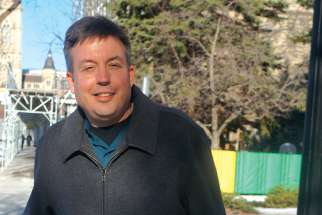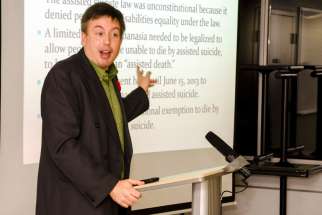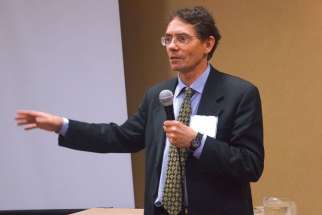Wife loses her battle to stop husband’s death
OTTAWA - A Nova Scotia man got what he wanted — a medically assisted death — just one day after his estranged wife lost her bid to block him from using Canada’s medical assistance in dying (MAiD) system.
Assisted-suicide bill re-introduced
Ontario’s assisted suicides up 78 per cent
Ontario was home to 1,499 instances of assisted suicide last year, a 77.8-per-cent increase over 2017, according to numbers released by Ontario’s Office of the Chief Coroner.
OTTAWA – A study that claims euthanasia and assisted suicide could save the health-care system more than $100 million annually is ringing alarm bells among assisted-killing opponents.
Schadenberg receives Exner Award
TORONTO – Anti-euthanasia activist Alex Schadenberg has been honoured with the Archbishop Adam Exner Award for Catholic Excellence in Public Life by the Catholic Civil Rights League for his ongoing advocacy against euthanasia and assisted suicide.
More time needed to define assisted suicide, conference told
MONTREAL - As Canada moves toward legalized assisted suicide starting in February, Quebec will jump the gun and become the first province to permit doctors to euthanize patients beginning next month.
No denying, Canada is on slippery slope to euthanasia
Updated 11/6/14
TORONTO - Canada's health care industry is already on a slippery slope to accepting euthanasia and it may soon turn into a full-blown avalanche, warns Alex Schadenberg.
Zealous opposition awaits anti-euthanasia proponents
GATINEAU, QUE. - As the Supreme Court of Canada prepares to hear arguments Oct. 15 on assisted suicide, activists against euthanasia warn of the zeal of their opponents.
PQ’s ‘medical aid in dying’ sugarcoats euthanasia, foes say
OTTAWA - Anti-euthanasia groups are pushing back against Parti Quebecois plans to bring in euthanasia under the euphemistic guise of “medical aid in dying.”
Quebec grassroots group Living with Dignity director Linda Couture said the PQ is masking its euthanasia plans behind the words medical aid in dying without defining them, she said. “Does it mean (lethally) injecting people or not?”
Couture expressed alarm at how fast the government is moving, noting the new government hopes to have a bill passed by June next year.
In early October, radio station CJAD reported Parti Quebecois junior social services minister Veronique Hivon hoped to introduce legislation soon to help people who face unbearable end-of-life suffering. Though euthanasia and assisted suicide are both illegal in Canada’s Criminal Code, and under federal jurisdiction, Hivon said health is a provincial matter. The province could also direct Crown prosecutors not to prosecute cases that fall under the guidelines for medical aid in dying, she said.
Couture said using health care and directing prosecutors in this manner is bringing in “euthanasia through the back door” while hiding behind a vague, nice-sounding phrase.
The province’s plans to move in this direction stem from recommendations of an all-party Dying with Dignity committee that held hearings across Quebec and released a report last March, Couture said. Though 60 per cent of the presenters to this committee opposed euthanasia and assisted suicide, the committee’s report recommended “medical assistance in dying” for those suffering and close to death. It ignored grassroots rejection of euthanasia and assisted suicide, Couture said.
“Everybody’s in favour of palliative care. Let’s work on what unites us not what divides us.”
Couture dared the small group of physicians who are pushing for euthanasia to put their faces on a public poster the way members of a new anti-euthanasia physicians’ organization has. The Physicians’ Alliance for Total Refusal of Euthanasia is led by the renowned Dr. Balfour Mount, considered the father of palliative care in Canada. His organization boasts 24 prominent physicians who have allowed their pictures to be published.
“We are physicians who see any law allowing doctors to intentionally end the life of their patients as contrary to the goals of medicine and the good of our patients, especially the most vulnerable and those who cannot speak for themselves,” says the group’s web site. “We intend to make known to the public the grave dangers inherent in such a law.”
At its web site, the group has a declaration and petition for both doctors and concerned citizens to circulate and send to their provincial representatives.
“To provoke death voluntarily, by lethal injection or any other method, cannot be considered under any circumstance as ‘medical care’ and is contrary to medical ethics,” the declaration reads. “It is never necessary to kill a patient in order to end his or her suffering.”
Euthanas ia Prevention Coalition director Alex Schadenberg said Quebec’s sleight of hand could bring in Belgium-style euthanasia and its lack of safeguards. A study published in the Canadian Medical Association Journal found that one-third of euthanasia deaths in Belgium were done without explicit request or consent. If medical aid in dying means doctor’s giving patients lethal injections, that is euthanasia, he said. Doctors writing prescriptions for patients knowing they will use the drugs to kill themselves is doctor-assisted suicide.
The Catholic Organization for Life and Family (COLF) said Hivon’s plans to introduce a bill are not a surprise because it was part of the Parti Quebecois’ platform. But she questioned whether the government listened to palliative care experts or the democratic results of the Dying with Dignity consultations.
“Medicine, today, can control almost any pain,” said COLF director Michele Boulva. “And, in extreme cases, palliative sedation can be used to relieve patients.”
The pro-euthanasia lobby has been trying to show Belgium-style euthanasia is working well, she said, but a group of Belgian professionals said in a manifesto signed last June that the slippery slope they had warned of 10 years ago when Belgium decriminalized euthanasia had become a reality.
“We are now very worried by suggestions that minors and mentally ill people could also be euthanized,” the manifesto says. “As we expected, once the prohibition has been lifted, we are rapidly moving towards the banalisation of euthanasia.”
“Can you even imagine teaching future doctors how to kill?” Boulva asked.
“COLF encourages Quebec Catholics and all people who have any respect for the inalienable dignity and worth of all human beings to contact their elected members of the Assemblée nationale, asking them with insistence to oppose any attempt to legalize euthanasia. This lethal practice must not enter our hospitals.”










